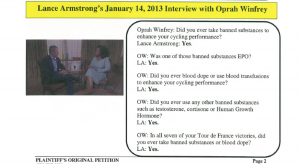Source of article CourtroomLogic Consulting.
 Remember when the name “Lance Armstrong” was synonymous with cycling, Tour de France, and über-athleticism? And remember how all that love came to a screeching halt in 2013 when Armstrong was essentially banned from competing in the sport for life due to his long history of using performance-enhancing drugs?
Remember when the name “Lance Armstrong” was synonymous with cycling, Tour de France, and über-athleticism? And remember how all that love came to a screeching halt in 2013 when Armstrong was essentially banned from competing in the sport for life due to his long history of using performance-enhancing drugs?
What you may not remember is the post-doping lawsuits that were borne from various companies’ attempts to recover prize money, endorsements, and a host of other contractual issues. Enter: SCA Promotions, Inc. v. Lance Armstrong, et al. (DC-13-01564) in the 116th Judicial District Court of Dallas County, Texas. Although I did not personally work on this case—and have no idea how it ended—I want to talk about the Original Petition, which is one of the best examples I’ve seen (outside of my own work, of course) of how to use compelling themes in litigation.
Theme development is a fundamental part of every single case, no matter the size, the court, or the cause of action. At multiple points during the life of your case, someone will make outcome-determinative decisions based on personal perceptions and interpretations of your case. And that decision-maker could be a judge, arbitrator, insurance carrier, mediator, or a panel of jurors.
A Manipulator, a Liar and a Bully
In SCA v. Armstrong, it was evident that counsel had already noodled ideas, tossed around phrases that could “hook” the audience, and boiled down their story into a handful of key themes. The first nine pages of the petition read like a story rather than a regurgitation of facts and legal issues and core themes were woven into the allegations. The petition was designed to appeal to human emotion. For example:
- Lance Armstrong is a “cold-hearted”, “deliberate” liar.
- He is a “bully” who manipulated others.
- He built a “wall of deceit.”
- Lance’s circle lived with a “code of silence.”
- Armstrong “stopped at nothing to maintain his fiction.”
- Armstrong “made a mockery of the legal system.”
And it gets better.
Counsel even included visual images to emphasize the validity and importance of various statements made by Armstrong, including images from deposition testimony. And interviews with Oprah. Yes, Oprah. For example:

Pretty powerful stuff.
Why is Theme Development Important?
Themes are important for four reasons:
- Themes can help organize new information and categorize the character and conduct of the parties.
- Themes breathe life into factual elements of your case, and provide “soundbites” and “taglines” that are memorable and catchy. If the case is newsworthy, there’s a very good chance the media will latch onto some of your soundbites, too.
- Themes resonate with our life experiences and preconceived attitudes about how the world should work. In addition, themes that are personally meaningful ignite emotion. And emotion triggers a desire for change.
- Themes provide the trial team with an initial framework for case management. Early theme development helps organize known and to-be-known facts, determine requests for production and interrogatories, develop questions for depositions, assert legal positions, identify supporting facts, determine witness roles and scope of testimony. The list goes on.
As we mentioned earlier, everyone benefits from the strategic use of themes: judges, arbitrators, insurance carriers, jurors, even witnesses.
But how in the world do you find case themes before you begin to draft the Original Petition or Response?
It can be difficult to convince an end-client that pretrial research is beneficial at such an early stage. But it’s always best to conduct some form of jury research to confirm that you’re on the right track (or to correct your path if you’re on the wrong track).
Trial themes can still be effectively developed early in the case with a shoestring budget. It’s as easy as spending 3-4 hours brainstorming with your trial team. Ideally, that team should include a litigation consultant who can offer insight on emotional hot buttons that may be irrelevant to legal strategy or liability issues, but critical to juror perception and decision-making.
Identifying themes early on – as soon as the initial filings and response – can help litigants shape a vision for where the case is ultimately headed and provide the trial team with a roadmap for success.
At CourtroomLogic Consulting, we help our clients think like a juror from the get-go by helping them develop themes at the earliest stages of litigation. Don’t wait until the evidence is set in stone to start developing your case for a jury. Contact us at info@courtroomlogic.com for a consultation.
The post How a Cold-Hearted Bully Illustrates the Importance of Theme Development appeared first on CourtroomLogic.
